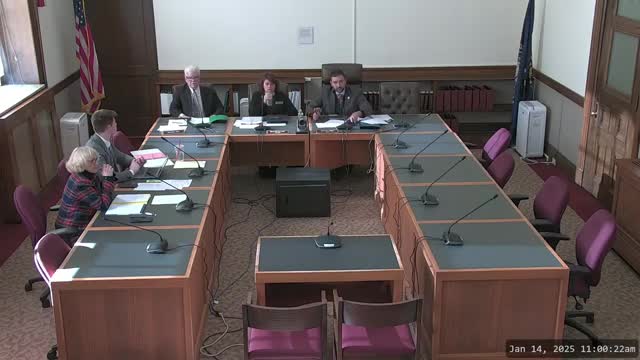Senate committee votes 3-0 not to advance bill to allow pending criminal charges in child-care background checks
Get AI-powered insights, summaries, and transcripts
Subscribe
Summary
The New Hampshire Senate Children and Family Law Committee voted 3-0 in executive session to recommend against advancing Senate Bill 22, a DHHS-requested measure that would allow the child-care licensing unit to receive pending criminal charges on background checks.
The New Hampshire Senate Children and Family Law Committee voted 3-0 in executive session to recommend not passing Senate Bill 22, a Department of Health and Human Services request that would have allowed the child-care licensing unit to receive pending criminal charges on background checks.
Sen. Howard Pearl, R‑District 17, introduced the bill and said the measure was requested by DHHS to help the childcare licensing unit "get these background checks through" more effectively. Melissa Clement, chief of the Childcare Licensing Unit at DHHS, told the committee the change would let the agency see pending charges so it can evaluate whether an individual should be excluded from working with children.
"The legislation would permit us to receive all charges, those that are pending, so we can evaluate those to ensure that we do not have people working with children who would be excluded had they been convicted of the crimes that they are currently charged with," Clement said.
Clement said current practice often returns only convictions, meaning the agency could approve applicants who have pending charges that, if convicted, would disqualify them. She added that DHHS already has the authority to remove an approved employee from a child‑care setting if the agency learns that person has been charged with a disqualifying offense while charges are pending.
The bill text, as presented, would amend RSA 170‑E:7 and RSA 170‑E:29 to expand the criminal‑history records DHHS may receive for initial background checks. Committee members asked about annulments and dismissed charges; Clement responded that if a conviction has been annulled or charges dismissed and it does not appear on the record, DHHS would not see it through the record check and an employer could ask the applicant directly if concerned.
Victor Muzzy, head of the Justice Information Bureau and the Criminal Records Unit for the New Hampshire State Police, told the committee the department helped craft the bill language. "Our intent from our perspective in supporting this is to provide them with the full record," Muzzy said, adding that in past cases information from other states had not been available and that had prevented licensing staff from seeing disqualifying items on an applicant's record.
A representative of a statewide childcare nonprofit, Katie Brissett, said her organization supported the bill and described the licensing unit as "great partners" who listen to providers and families.
In executive session, the committee voted on a motion "not to pass" Senate Bill 22; the chair announced the motion passed, 3‑0, which sends a recommendation against the bill advancing. The motion's maker and seconder were not specified on the public transcript record.
The bill request originated with DHHS; proponents said the change was intended to extend to child‑care settings the kind of background‑check access currently available to the Department of Education. With the committee's 3‑0 recommendation against SB 22, the measure will not advance from this committee at this time.
